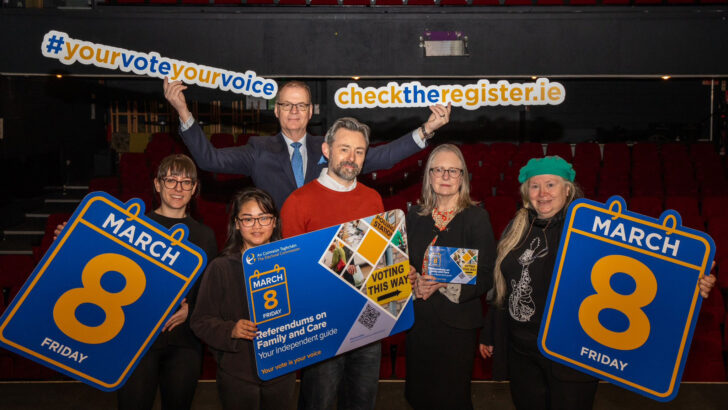So, referendum time has come around again. It’s hard to deny the centrality of the process in a democracy. In a way it’s the purest form, though you can’t have referendums on everything – it’s just not practicable. Because it’s so important, it is essential that it be fair and transparent – treated with respect. Yet some referendum are never implemented (7th Amendment) and others are activated as soon as possible (8th Amendment).
Last week Morning Ireland (RTÉ Radio 1, Thursday) covered the launch of the information campaign from the newly formed Electoral Commission. In Mary Regan’s report we were told they would be sending out booklets to every house.
I’d suspect media debates will be more crucial, so it’s all the more important that such debates be fair, neutral, objective and balanced. I preferred it when the official booklets from the now subsumed Referendum Commission set out the pros and cons, the arguments for Yes versus those for No.
I don’t think there was any major public demand for these votes – the report said the Government was using it as a form of “constitutional catchup”, to bring the Constitution into line with “current day values” (who decides what they are?).
That begs more than a few questions. The report flagged issues relating to how the phrase ‘durable relationships’ would be defined – of course the courts will decide, not ministers trying to be reassuring, or the Electoral Commission, however well-intentioned.
I think Mary Regan was right when she said that the input of civil society groups would be influential. The National Women’s Council (whose views only represent some women) regarded the language in the current articles to be “sexist” and “stereotypical”. Yet the Government could have just deleted the articles, or changed ‘woman’ in the home to ‘parent’ (thus achieving the holy grail of gender neutrality).
The issue was discussed on Saturday with Colm Ó Mongáin (RTÉ Radio 1). It was one of a few scheduled items, but as so often happens it was 2 to 1 in favour of a Yes vote. Michael McNamara TD was against it, though not on any principled objection to the content, but rather because he wasn’t convinced of the necessity of the measure, and thought wouldn’t add anything to citizens’ “legal protections”.
Government spokesperson Minister Joe O’Brien of the Green Party favoured a Yes vote and sought to pare the referendum votes to their basics, but these were just his opinions – no knowing what future Supreme Court judges will make of it.
Jennifer Whitmore TD of the Social Democrats sought a Yes vote, speaking ‘as a woman’, but I felt her arguments were questionable. First of all, she maintained that the present article of the Constitution “essentially” said that woman’s place was in the home. Panto-style I thought ‘Oh no it doesn’t’. She must have heard me and then said it doesn’t “specifically” say that, but that’s the message it gives out! With opposition like this who needs Government?
On Anton Savage (Newstalk, Saturday) conservative commentator Laura Perrins made the point that the vote would be undemocratic as it was the judges who would ultimately decide what the new articles meant.
She found the wording “incredibly vague”, that it “undermines marriage” and was “bad for children”. Referencing research studies, she said children had better outcomes in married families and that was what should be promoted, but without stigmatising other family forms.
She thought the current use of the word ‘woman’ was not sexist and should not be erased from legal documents. Currently the Constitution offered important recognition of all the unpaid caring work that women do – generally, she pointed out, the burden of caring falls mainly on women.
Karen Kiernan, CEO of the group One Family thought that the new wordings “might be mostly symbolic”, and that it wouldn’t take away from the status of marriage, but would provide enhanced recognition for unmarried families.
She said that a Yes vote would be a strong signal to the Government to improve services. I’m not sure that the Government responds well to strong signals of a symbolic nature.
They have certainly failed to ensure compliance with the original article – failed to ensure that mothers will not be obliged to go to work by economic necessity. Maybe they fear a legal case being brought to give enforcement, at last, to this original article, and maybe that’s one of the real reasons for this referendum.
PICK OF THE WEEK
SONGS OF PRAISE
BBC One Sunday, February 4, 1.15pm
In Newcastle upon Tyne, Rev. Kate Bottley hears how faith and compassion can support prisoners and ex-offenders in their journey to rehabilitation.
FINDING BRIGID
RTÉ One Monday, February 5, 6.30pm
Ireland celebrated its first public holiday dedicated to a woman in 2023. Siobhán McSweeney, of Derry Girls’ fame, goes in search of the real St Brigid (Repeat).
YES, PRIME MINISTER
BBC 4 Tuesday, February 6, 8.30pm
Classic political comedy. Jim must recommend the appointment of bishops to the Queen but is not keen on the two offered by the Church.


 Brendan O’Regan
Brendan O’Regan The Electoral Commission begin their referendum campaign in Co. Sligo, meeting the artistic community in Hawk’s Well Theatre.
The Electoral Commission begin their referendum campaign in Co. Sligo, meeting the artistic community in Hawk’s Well Theatre.